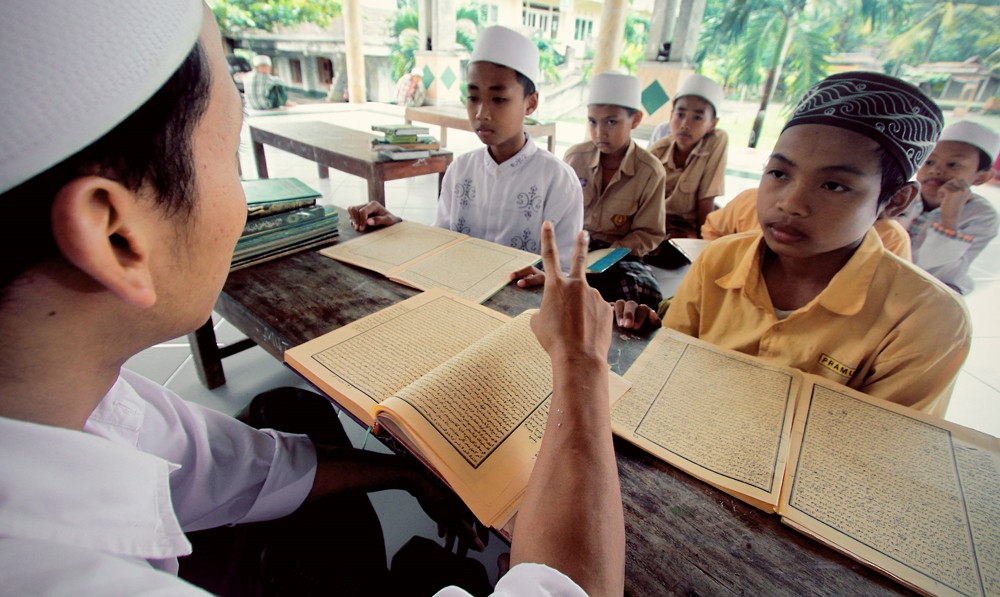Popular Reads
Top Results
Can't find what you're looking for?
View all search resultsPopular Reads
Top Results
Can't find what you're looking for?
View all search resultsIndonesian teachers struggle to promote tolerance
Change text size
Gift Premium Articles
to Anyone
A
hmad Budiman, a spokesman for the Indonesian Islamic Education Teachers Association (AGPAII), said he acknowledged the huge responsibility his organization had to bear. With intolerance rising, many have pointed their fingers at the failure of religion teachers to instill the values of tolerance and inclusive in Indonesian youth.
A 2016 study by the Center for the Study of Islam and Society (PPIM), for instance, found 80 percent of Islamic education teachers refused to give shelter to the followers of Ahmadiyyah and Shia Islam, the two Islamic sects that are considered heretical by majority Sunni Muslims.
Moreover, the study, which was conducted in West Java, Banda Aceh, West Nusa Tenggara, South Sulawesi and Central Java, found 81 percent of Islamic education teachers rejected the establishment of places of worship for religions other than Islam and 78 percent of them believed nonMuslims should not be allowed to teach in Islamic schools.
While the PPIM study does not necessarily represent all Islamic education teachers in the country, with the survey conducted in cities widely known as conservative bastions, it has been seen as a wakeup call for reform in Islamic education and better training for the people who teach it so that they can help stem the tide of religious bigotry.
The AGPAII, which has around 200,000 members nationwide, has held a number of programs to promote tolerance among its members, Ahmad said. Last year, for instance, the association sent 30 teachers to spend a few days living with the beleaguered Ahmadis in Kuningan, West Java, to learn about each other’s religious views.
Ahmad, who took part in the program, said he acknowledged that he and the Ahmadis had different views on Islam, but stressed that he now could accept their differences, and more importantly, could empathize with their suffering. “I can feel the pain of being discriminated against. I can feel their struggle in obtaining IDs. Humanity has connected us as human beings,” he said during a recent visit to The Jakarta Post.
Ahmad, who teaches at a vocational school, however, lamented the fact that not all Islamic education teachers could have such an experience, admitting that some of his fellow teachers have shown hostility toward the beliefs of others, particularly followers of different sects within Islam.
There are a number of reasons for that, the AGPAII said.
AGPAII secretary-general Mahnan Marbawi, for instance, highlighted the fact that not all Islamic education teachers had strong religious education backgrounds, citing that as the reason why some of them had failed to understand the importance of incorporating the values of tolerance in classrooms.
“Teachers’ educational backgrounds shape the way they teach in class. Consequently, some of them do not stick to the national curriculum that actually promotes tolerance,” he said, admitting that some teachers may have learned about Islam from the internet.
The other problem is that some Islamic education teachers are underpaid. Some of them earn less than Rp 500,000 a month, Budiman claimed. Islamic education teachers are mostly hired by the Religious Affairs Ministry or the local administrations.
The teachers, Budiman said, were entitled to monthly “certification” allowance of between Rp 1.5 million (US$112) and Rp 3.5 million, but many of them had yet to get paid.
(Read also: Teachers' day: Questioning role of teachers in Indonesia)
The government owes around Rp 1.4 trillion to at least half of AGPAII’s members, Budiman claimed. Islamic education teachers are expected to help instill tolerance in Indonesian youth, but many of them are struggling financially, he added.
Nevertheless, the AGPAII said it would continue its mission to educate its members on the importance of spreading the values of tolerance in the country. “We need to provide training on religious tolerance for all teachers because they have the control over their classes. They have influence over their students because they have the autonomy over what kind of religious perspectives to deliver to students,” AGPAII adviser Imam Tholkhah said.










